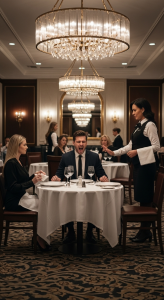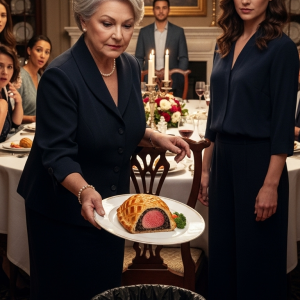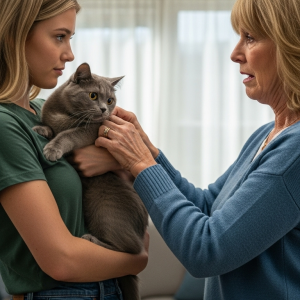The divorce had been Richard’s masterpiece, or so he believed. He had painted his wife, Grace, as a flighty, unambitious woman, content to live off his success. He had been “generous” in the settlement, giving her a sum that, to his mind, was just enough to allow her a few comfortable years before she inevitably came crawling back, a lesson learned. He saw himself as a magnanimous victor.
In the months that followed, he reveled in his freedom. He dated younger women, closed bigger deals, and basked in the sympathetic glow of his social circle, who saw him as a man finally unshackled from a dull, domestic anchor. He had always held a quiet contempt for Grace’s passions. Her love for the culinary world, her detailed notebooks filled with ideas for restaurant management, her talk of menus and ambiance—he had dismissed it all as “the trivial little hobbies of a woman with too much time on her hands.”
Grace, for her part, had simply vanished. She left their shared world of charity galas and country club brunches without a whisper. Richard assumed she was hiding in shame, living a diminished life somewhere, burning through her settlement on rent and takeout. The thought gave him a small, smug sense of satisfaction. He had been right about her. She was nothing without him.
One evening, over drinks with a colleague, he heard a rumor. Aurelia, the Michelin-starred restaurant where he and Grace had celebrated a decade of anniversaries, was in trouble. The celebrated chef-owner was retiring, and the place was hemorrhaging money. “They say some mysterious new buyer is sniffing around,” his colleague had mentioned offhandedly. Richard felt a pang of nostalgia, quickly replaced by an idea, a cruel, amusing little spark. He decided he would go back, to reclaim the space as his own, to toast his success in the very place that held the ghost of his failed marriage.
It was on a Tuesday night that he saw her. He was at the bar at Aurelia, sipping a ridiculously expensive scotch, when he spotted a new waitress. She was blonde, efficient, her hair tied back in a neat, professional bun. It took him a moment to realize it was Grace.
A slow, cruel smile spread across his face. It was more perfect than he could have imagined. He watched her for a few minutes, taking in the crisp, black uniform, the way she expertly balanced a tray, the polite, practiced smile she gave her customers.
He couldn’t resist. He pulled out his phone, angled it just so, and took a picture of her as she cleared a nearby table, her back partially to him. He immediately sent it to a group chat with his closest friends, all of whom had been on “his side” in the divorce.
“Guess who’s waiting tables at Aurelia?” he typed, the words glowing on his screen. “Looks like the ‘generous’ divorce settlement is finally running dry. From the penthouse to pouring pinot. Life comes at you fast. 😂”
He saw her approach the bar to put in an order. He called her name, his voice dripping with false surprise. “Grace? My God, is that you?”
She turned, and for a split second, he saw a flicker of something in her eyes—not shame, not surprise, but something cool and appraising. It was gone in an instant, replaced by a mask of professional politeness. “Good evening, Richard,” she said, her voice even. “Can I get you another drink?”
Her composure infuriated him more than any outburst could have. He had wanted to see her crumble, to see the humiliation in her eyes. Instead, she was treating him like any other customer. “No, I’m fine,” he said, his voice laced with condescension. “Just… surprised to see you here. It’s good you’ve found some… honest work.” She just nodded, turned, and went back to her tables, leaving him feeling strangely deflated, the victor of a battle his opponent hadn’t even acknowledged.
A few weeks later, the biggest deal of Richard’s career was on the line. A multi-million dollar contract with Sterling International, a corporate giant run by the notoriously old-fashioned and family-oriented CEO, Mr. Sterling. The final step was to win over the man himself. Richard, in a stroke of what he considered genius, had learned that Sterling’s only daughter, Chloe, a bright, discerning art history major, would be in town. He arranged a dinner, a move designed to show he was a man who understood the value of family connections.
The venue had to be perfect. Impressive, elegant, a place that spoke of power and taste. An idea, sharp and malicious, formed in his mind. He would take Chloe to Aurelia. And he would ensure Grace was their waitress. It was the perfect two-pronged attack: impress the girl, and finally, unequivocally, put his ex-wife in her place in front of a new, important audience.
He made the reservation himself. “A table for two, eight o’clock,” he’d said to the reservations manager on the phone. “And I have a special request. I’d like the blonde waitress to serve my table. I believe her name is Grace. She’s an… old family friend. It would be a lovely surprise.” The request was so unusual, so laden with unspoken meaning, that the manager had simply said, “Of course, sir.”
On the other side of town, Grace was in the middle of an eighteen-hour workday. She spent her mornings in the kitchen with the prep cooks, her afternoons with the accountant, and her evenings on the floor, observing, learning, absorbing every single detail of the business she now owned. The restaurant was her life, her entire focus.
When the reservations manager brought her the special request, a slow, knowing smile touched her lips. She had known this day would come. She had been counting on it. Richard’s arrogance was as predictable as the tides. He couldn’t resist an opportunity to feel superior, to rub her face in his success. She had vanished from his world, and he had interpreted her silence as weakness. He had no idea it was the quiet of a predator, patiently waiting for the prey to walk directly into the trap. “Of course,” she told the manager calmly. “I would be happy to personally take care of Mr. Thompson’s table.”
Aurelia was at its best that night, a symphony of soft lighting, burnished copper, and the low, happy hum of a full dining room. Richard was in his element, charming and attentive, regaling a clearly impressed Chloe Sterling with tales of his business acumen.
Right on cue, Grace approached their table, a water carafe in hand, her waitress uniform immaculate. “Good evening, Richard,” she said, her voice a perfect blend of professional deference.
Richard beamed, his moment of triumph finally at hand. He turned to Chloe, his expression one of amused condescension. “Chloe, I’d like you to meet Grace,” he said, gesturing to her as if she were a piece of furniture. “A bit of an old acquaintance. It’s a sad story, really. Some people just aren’t built to handle life on their own, are they? But it’s wonderful that she’s found some… honest work to keep her busy.”
He then turned back to Grace, ready to order her around like a servant. “Now, Grace, be a dear and bring us a bottle of the ’82 Pétrus. We have much to celebrate.”
It was then that Grace made her move. She didn’t pour the water. She simply stood there, a small, knowing smile on her face. “Richard, I’m going to have to stop you there,” she said. Her voice had changed. The practiced deference of a waitress was gone, replaced by a cool, crisp tone of absolute command.
Richard’s smug expression faltered. “I beg your pardon?”
“I said, I’m going to have to stop you,” she repeated, her voice carrying easily in the suddenly quiet dining room. Other patrons were beginning to look over. “Because as the new owner of Aurelia, I have a strict policy against disruptive and disrespectful patrons. My staff is to be treated with courtesy at all times.”
The color drained from Richard’s face. Chloe Sterling stared at him, her fork frozen halfway to her mouth, her expression shifting from admiration to horrified disbelief.
Grace continued, her voice calm and surgical. “You came into my establishment under the pretense of a dinner, but with the clear, malicious intent to harass a member of my team—who, tonight, happens to be me. That is unacceptable.” She looked him dead in the eye, the years of quiet humiliation fueling her final, devastating words. “And so, I am exercising my right to refuse you service. I am going to have to ask you, and your guest, to leave. Now.”

The entire restaurant was silent, watching. Richard sat there, utterly speechless, his face a mask of apoplectic rage and profound, public humiliation. The trap had been sprung. The checkmate was absolute. Chloe Sterling, her face a mixture of disgust and embarrassment, quietly placed her napkin on the table and stood up, not even giving him a backward glance as she walked towards the exit. Richard was left alone at the table, a king dethroned in the middle of his own court, by the very person he thought he had conquered.
The destruction of Richard Thompson was as spectacular as it was swift. Chloe Sterling, a smart and principled young woman, told her father everything—the condescending tone, the malicious request for the waitress, the whole ugly, arrogant display. Mr. Sterling, a man who valued character above all else, cancelled the multi-million dollar contract the very next morning. “I don’t do business with men who lack basic decency,” was the cold, final message his assistant relayed. Richard’s personal cruelty had cost him the biggest deal of his life and had branded him a pariah in their industry.
The story of the showdown at Aurelia, meanwhile, spread through the city’s elite circles like wildfire. It became a legend, told with relish at dinner parties and over cocktails. Richard, the titan of industry, had become a laughingstock, a cautionary tale of hubris and comeuppance.
But this story was not truly about Richard’s fall. It was about Grace’s rise.
Three months later, the restaurant closed for a massive renovation. It reopened not as Aurelia, but as “Grace,” a name that was a quiet declaration of independence and ownership. The new space was a reflection of its owner: elegant, warm, and unapologetically brilliant.
It became the hottest reservation in the city. The food was inventive, the service impeccable, the atmosphere electric. Grace was not just the owner; she was the heart and soul of the place. She had taken the ashes of her past life and built something beautiful and thriving. She was no longer “Richard Thompson’s ex-wife”; she was Grace Thompson, the celebrated restaurateur, a name that commanded respect in her own right.
One evening, about a year after the grand reopening, a renowned food critic, a man known for his sharp wit and even sharper palate, was dining at the bar. He and Grace fell into a long conversation about food, wine, and the crazy, beautiful business of making people happy. He was captivated not just by her knowledge, but by the quiet strength and passion that radiated from her.
He looked around the bustling, joyous dining room. “You’ve built something truly special here, Ms. Thompson,” he said, his admiration genuine.
Grace smiled, a real, unburdened smile that reached her eyes. She looked at the world she had created, a world born from betrayal but built with her own two hands. “Thank you,” she said. “It turns out, the best revenge is a life lived beautifully.”
The weeks following what the city’s elite had dubbed “The Aurelia Takedown” were, for Richard, a slow, agonizing slide into a new kind of hell. The story had taken on a life of its own, becoming a piece of modern folklore whispered at every cocktail party and business lunch. He was no longer Richard Thompson, the shrewd investor; he was “the Aurelia guy,” a punchline, a walking caricature of arrogance served cold.
The Sterling deal, of course, had vanished. But the damage was not contained to that one contract. The story had painted him as petty, cruel, and, worst of all, a fool. In his world, a man could be a shark, but he could never be a fool. Other clients, spooked by his now-toxic reputation, began to pull away, citing vague concerns about “brand alignment” and “character.”
He sat in his stark, minimalist office, a space that had once felt like a command center and now felt like a pristine prison cell. He was on the phone with a long-time client, trying to salvage a wavering account. “John, I can assure you, the entire incident was a misunderstanding, a private matter blown completely out of proportion,” Richard said, the practiced charm in his voice sounding thin and desperate even to his own ears.
There was a cool pause on the other end of the line. “Look, Richard,” the client said, his voice lacking its usual warmth. “The numbers are fine. But business, at our level, is about relationships. It’s about trust. My wife was at a charity luncheon yesterday where your… ex-wife was also a guest. She said Grace Thompson is one of the most intelligent, resilient people she’s ever met. Perception is reality, Rich. And the perception right now is not in your favor.” The call ended soon after. The account was gone.
Richard slammed the phone down, the sound echoing in the silent, empty office. He stared out at the city, his city, which now felt alien and hostile. He felt a surge of bitter, impotent rage. He blamed Chloe Sterling for being a tattletale. He blamed her father for being a sanctimonious old goat. But most of all, he blamed Grace. In his mind, she hadn’t outsmarted him; she had cheated, using some bizarre, underhanded trick. He still couldn’t comprehend that her success was born from the very passion he had always disdained. He was a man drowning in consequences, still blaming the tide instead of the fact that he had forgotten how to swim.
One year later, the name on the city’s most coveted reservation list was not Aurelia, but simply, “Grace.”
The grand reopening had been the talk of the town. Grace had gutted the old, stuffy restaurant and rebuilt it in her own image. The new space was a masterpiece of understated elegance—warm woods, soft lighting, burnished copper accents, and a magnificent, open kitchen where a team of talented young chefs moved with the grace of a ballet troupe. The atmosphere was alive, humming with the energy of people enjoying truly extraordinary food and impeccable, yet unpretentious, service.
Grace was the sun around which this new solar system orbited. She moved through the dining room not as a frantic manager, but as a confident, gracious host. She knew the names of her regulars, the wine preferences of the city’s top critics, and the strengths of every single person on her staff, from the head chef to the newest busboy. She led not by decree, but by example, her own passion for excellence infusing every corner of the establishment.
Tonight was the restaurant’s first anniversary, and the place was electric. Julian Vance, the sharp-witted food critic who had been at the bar that fateful night a year and a half ago, was now sitting at a corner table, not as a critic, but as her partner. He watched her work, a look of profound admiration on his face. Theirs was a relationship built on a shared language of flavor profiles, late-night industry talk, and a mutual respect for each other’s craft.
As the last dessert was served, a guest, the editor of a major lifestyle magazine, stopped by Grace’s table. “Grace, that was simply sublime,” the woman gushed. “The piece we’re running on you next month is titled ‘The Quiet Triumph.’ I hope you like it. Your story… it’s become an inspiration for so many people.”
Grace smiled, a genuine, unburdened smile that seemed to light up the room. “Thank you, Eleanor. I just wanted to build a place where people could feel happy and cared for.”
Later that night, after the last guest had departed and the staff had gone home, she and Julian sat at the bar, sharing a glass of wine. “A quiet triumph,” Julian mused, swirling the deep red liquid in his glass. “She’s not wrong. You never badmouth him. You never talk about what he did. You just… built this.”
“He built his life on tearing things down,” Grace said, looking around her beautiful, bustling restaurant. “His company, his relationships, me. I just decided I’d rather be a builder. It’s a much more satisfying way to live.” She had won, and in doing so, had discovered she was no longer interested in the war. She was too busy building a kingdom of her own.
Two years after the reopening, Richard was driving a sensible German sedan, having sold his Porsche to cover a margin call. His business was a shadow of its former self, a small consulting firm he ran from a modest office with a view of a parking garage. He was on his way to pick up a date, a woman who had insisted on dining at “the most amazing place,” and had given him the address for “Grace.” The irony was a bitter pill he was forced to swallow.
He parked across the street, a few minutes early. As he was about to get out, the front doors of the restaurant opened. A wave of warm, happy light and laughter spilled out onto the sidewalk. And in the middle of it stood Grace, saying goodnight to a group of laughing guests. She looked… radiant. She wore a simple, elegant blue dress, her face full of life and a calm, centered confidence he had never seen in her before.
Julian came up behind her and wrapped an arm around her waist, kissing her temple. They stood there for a moment, a portrait of easy, happy partnership. Richard felt a sharp, painful pang in his chest that was so intense it almost made him gasp. It wasn’t love. It was envy. It was the biting, acid realization of what he had lost—not the woman, but the capacity for that kind of light, that kind of joy.
As he watched, Grace turned her head slightly and her eyes, for a fraction of a second, met his across the street. There was no anger in her gaze. There was no pity. There was nothing at all. It was the brief, distant, impersonal recognition one gives a stranger, a face in a passing crowd.
Then she turned back to the man beside her, laughed at something he said, and disappeared back into the warm, bright world she had built.
Richard sat alone in the dark of his car, the engine silent. He was a ghost, haunting the edges of a life he was no longer a part of. The ultimate revenge, he finally, devastatingly understood, was not the public humiliation, not the lost fortune. It was her complete and total indifference. He had become irrelevant. And for a man who had built his entire identity on being the center of the universe, it was the cruelest, and most fitting, end of all.




